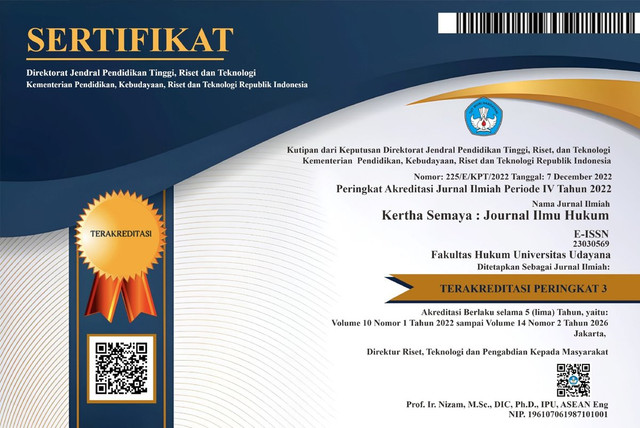VALIDITAS PERJANJIAN NON – AUTHENTIC SEBAGAI DASAR GUGATAN WANPRESTASI
DOI:
https://doi.org/10.24843/KS.2025.v13.i09.p14Keywords:
Perjanjian Non-Otentik, Validitas Hukum, Wanprestasi, Pembuktian, Keadilan SubstantifAbstract
Perjanjian non-otentik merupakan bentuk perjanjian yang sering digunakan masyarakat karena sifatnya yang sederhana dan efisien. Meskipun tidak dibuat di hadapan pejabat umum, perjanjian ini tetap menimbulkan akibat hukum apabila memenuhi unsur sahnya perjanjian. Permasalahan muncul ketika perjanjian non-otentik dijadikan dasar gugatan wanprestasi karena kekuatan pembuktiannya tidak sekuat akta otentik. Penelitian ini menggunakan metode yuridis normatif dengan pendekatan perundang-undangan, konseptual, dan kasus. Hasil penelitian menunjukkan bahwa perjanjian non-otentik memiliki validitas hukum yang diakui selama memenuhi ketentuan Pasal 1320 KUH Perdata dan dibuat dengan itikad baik. Dalam praktik peradilan, hakim tetap dapat menerima perjanjian di bawah tangan sebagai dasar gugatan apabila didukung bukti lain yang sah. Dengan demikian, keberadaan perjanjian non-otentik mencerminkan penerapan asas kebebasan berkontrak dan keadilan substantif yang menempatkan isi kesepakatan di atas formalitas hukum.
Non-authentic agreements are a form of agreement frequently used by the public due to their simplicity and efficiency. Even though they are not made before a public official, these agreements still have legal consequences if they meet the elements of a valid agreement. Problems arise when non-authentic agreements are used as the basis for a lawsuit for breach of contract because their evidentiary force is not as strong as an authentic deed. This research uses a normative juridical method with a statutory, conceptual, and case-based approach. The results show that non-authentic agreements have legal validity as long as they comply with the provisions of Article 1320 of the Civil Code and are made in good faith. In judicial practice, judges may still accept private agreements as the basis for a lawsuit if supported by other valid evidence. Thus, the existence of non-authentic agreements reflects the application of the principles of freedom of contract and substantive justice, which place the content of the agreement above legal formalities.
Downloads
Published
How to Cite
Issue
Section
License
Copyright (c) 2025 Renggi Pramita, Rasji

This work is licensed under a Creative Commons Attribution-NonCommercial-ShareAlike 4.0 International License.



